June 15, 2025 | 09:59 GMT +7
June 15, 2025 | 09:59 GMT +7
Hotline: 0913.378.918
June 15, 2025 | 09:59 GMT +7
Hotline: 0913.378.918
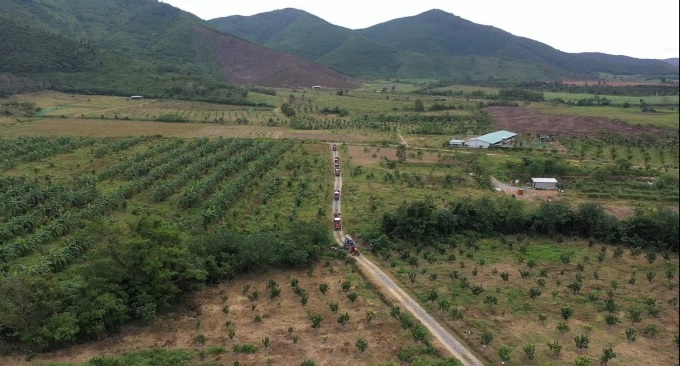
The Moshav Farm is located in Suoi Mo valley, Ninh Thuong commune, Ninh Hoa town. Photo: KS.
During April we had the chance to visit The Moshav Farm, more than 50 km north of Nha Trang city center (Khanh Hoa).
“The word moshav (מוֹשָׁב) has Hebrew roots, meaning ‘settlement’. It is understood as a cooperative agricultural community with many farms around. A moshav has many services such as agricultural inputs supply stores, agricultural products distribution shops as well as educational institutions and hospitals, which is very convenient. The Moshav Farm was thus born with the desire to develop such an agricultural service model,” said Nguyen Ta Dong, who is considered the "leader" of The Moshav Farm and the first to spark the idea of doing agriculture in this way.
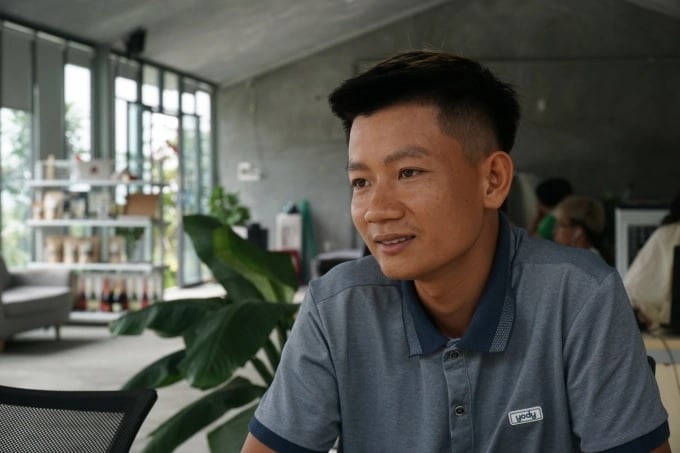
Nguyen Ta Dong is in charge of general management at The Moshav Farm. Photo: KS.
Established in 2018, The Moshav Farm originally consisted of five members: Nguyen Ta Dong (born 1995 in Dak Lak), Nguyen Manh Tien (born 1995 in Nghe An), Truong Hoang Nam (born 1995 in Dong Thap), Pham Minh Thong (born 1996 in Ben Tre) and Vo Hong Liem (born 1973 in Khanh Hoa).
They shared a passion for agriculture and spent some time as trainees in Israel studying and working on farms to learn “the way of modern farming”. They were willing to go against the current trend of leaving the city to work in the countryside.
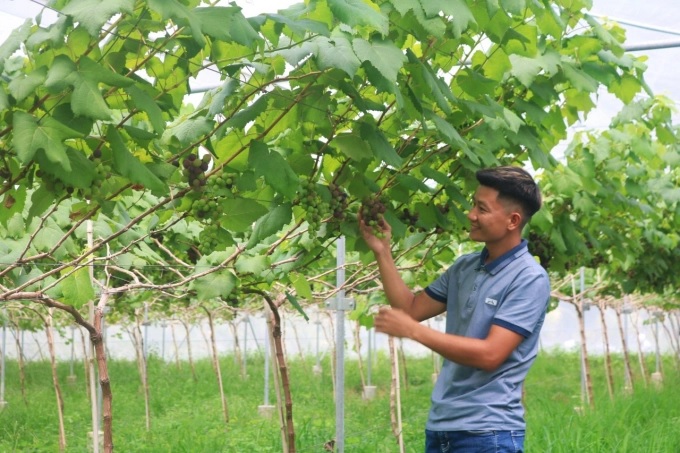
The on-farm grape farms grow and develop well, ready for harvest. Photo: KS.
The Moshav Farm has gone down the path of organic agriculture combined with tourism to make full use of the potential and efficiency of agriculture, as the Israelis are doing.
After a long time of traveling to places to survey and decide on a location, these 9X-generation youths chose Ninh Thuong commune to invest in. This location is suitable as it met the fundamental criteria the team set out, such as convenient transportation, available road infrastructure, 3-phase electricity, an adequate water source for production, and a large land bank at a cheap price.
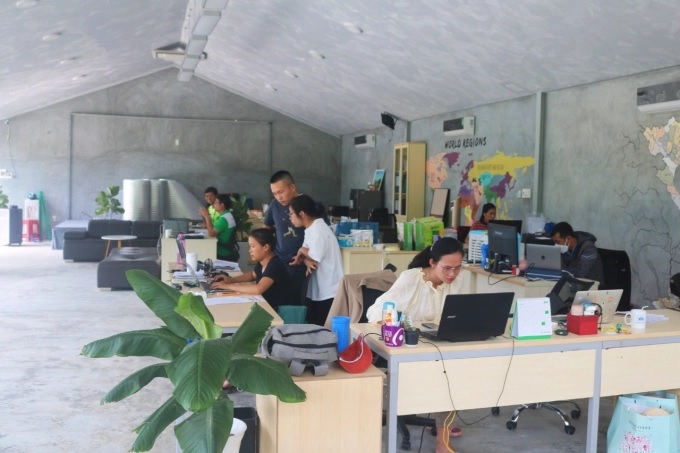
The on-farm work office is full of highly qualified young personnel. Photo: KS.
With an initial area of 10 ha purchased from the locals’ sugarcane plantations, The Moshav Farm has now expanded to 56 ha. The farm is methodically designed, including four areas: cultivation and breeding area; factory area; office area; dormitory area. The cultivation and husbandry area occupies most of the area, growing fruit trees such as coconuts, grapefruits, guava, grapes, jackfruit, mangoes, medicinal plants as well as raising sheep, deer and ostriches.
The total investment capital of the farm has exceeded VND 50 billion. The farm is trying to create valuable products and considers farmers to be a link in the farm's product chain in the near future.
The farm currently applies synchronous mechanization for production. The planting areas here are marked with separate numbers for management, installed with automatic drip irrigation, misting, and automatic fertilizing systems. Each area is arranged for each group of workers plus technicians in cultivation, animal husbandry and management. All daily work is reported and tracked on computer software.
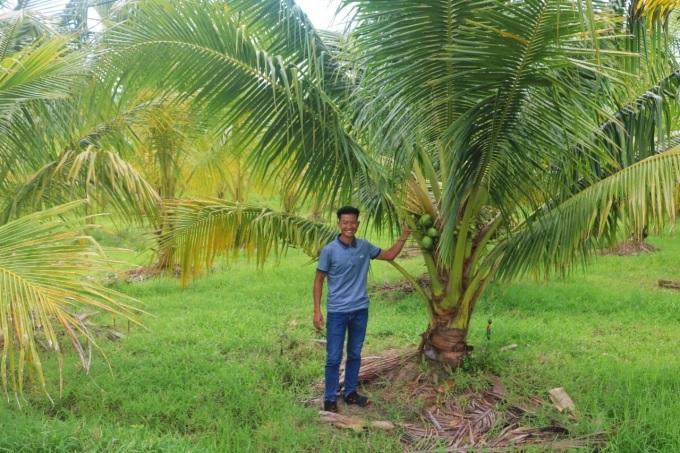
From a barren land, The Moshav Farm has renovated and "organicized" this place into a land of richness. Photo: KS.
The Moshav Farm is still in the "long-term farming" phase because it has only been established for three years. However the farm has made initial steps by introducing to the market ten product lines made from medicinal plants and short-term plants. In addition to on-site products, the farm also cooperates with many processing factories to optimize the manufacturing process. The products, mainly retailed at first, have now been distributed to more than 400 agents nationwide with a total revenue of VND 1 billion/month.
“For a long time the usual production mindset was to make a product and then look for output. Dong’s group did the opposite: we introduced the product first. We performed marketing from the beginning and maintained the information throughout the product-making process. So before the product was launched everyone knew about it already, making it easier to sell the products. But truth be told, it is the quality of the farm's products that determines the output’s sustainability," said Dong.
Translated by Samuel Pham
![Turning wind and rain into action: [4] Bringing climate bulletins to remote and isolated areas](https://t.ex-cdn.com/nongnghiepmoitruong.vn/608w/files/linhnhp/2025/06/14/1152-z6704423696987_15fd32ffc26d590d204d520c9dac6786-nongnghiep-151141.jpg)
(VAN) The Vietnam Agriculture and Nature Newspaper interviewed Mr. Vu Thai Truong, Acting Head of Climate Change and Environment at UNDP Vietnam, to gain deeper insight into how climate bulletins are delivered to farmers.

(VAN) In Tien Giang, a high-tech shrimp farm has developed a distinctive energy-saving farming model that has yielded promising results.
![Turning wind and rain into action: [3] 300.000 farmers benefit from agro-climatic bulletins](https://t.ex-cdn.com/nongnghiepmoitruong.vn/608w/files/news/2025/06/12/e5a48259d6a262fc3bb3-nongnghiep-125122.jpg)
(VAN) The agro-climatic bulletin has become a valuable tool for farmers in the Mekong Delta. After more than five years of implementation, the initiative is gradually being expanded nationwide.
![Turning wind and rain into action: [2] Providing forecasts to the people](https://t.ex-cdn.com/nongnghiepmoitruong.vn/608w/files/news/2025/06/12/e5a48259d6a262fc3bb3-nongnghiep-103927.jpg)
(VAN) In addition to improving the quality of hydrometeorological forecasts, putting forecast bulletins into practical use is crucial for production and disaster prevention.

(VAN) Blue carbon is receiving attention for its rapid absorption capacity and vast potential. It represents a promising nature-based solution to respond to climate change.
/2025/06/11/3507-1-161904_583.jpg)
(VAN) Seagrass beds and coral reefs serve as 'cradles' that nurture life in the ocean depths, creating rich aquatic resources in Vietnamese waters.
![Turning wind and rain into action: [1] Forecasting for farmers](https://t.ex-cdn.com/nongnghiepmoitruong.vn/608w/files/news/2025/06/11/e5a48259d6a262fc3bb3-nongnghiep-111919.jpg)
(VAN) Weather is no longer just a matter of fate. Forecasts have now become an essential companion for farmers in every crop season.